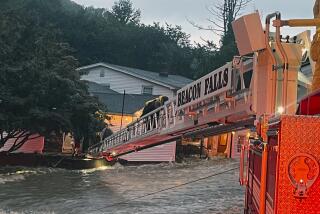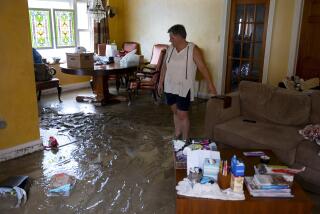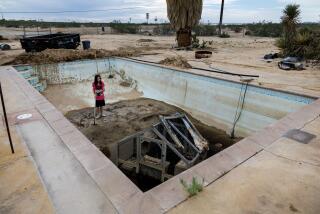Officials: Amid Sandy devastation, New Jersey needs more help
HOBOKEN, N.J. -- In this city across the river from New York reeling from Sandy-related flooding and power outages, officials are calling for more emergency resources to aid those who have been trapped in their homes for days.
About half the city was inundated in flooding that the city’s mayor called “really historic” and “devastating.”
Mayor Dawn Zimmer said that the National Guard had helped in efforts to meet the city’s vital basic needs. But Joel Mestre, the city’s deputy office of emergency management coordinator, said Wednesday that far more troops are needed after Sandy. Damage has been severe and floodwater has only grudgingly receded, he said.
PHOTOS: Super storm Sandy | Before and after the storm
Dozens of New Jersey National Guard troops worked into the night Wednesday with Hoboken emergency managers to check the city block by block, paying special attention to flooded areas where residents needed help.
The last National Guard caravan left City Hall at 8:45 p.m. Wednesday, 10 trucks winding through the southwest, then northwest sections of town.
In the lead truck was Mestre, whose own freshly remodeled home farther south in Point Pleasant had flooded.
Before they left, Mestre had briefed the guardsmen about their goal for the night.
“We’re pretty much going to go through town like a centipede,” he said as they huddled near a portable street light running off of a generator. “Then we’re going to suspend it for the evening. It’s getting too dark so I don’t want any of us getting hurt. It’s one square mile. It will take us an hour, hour and a half tops.”
Within moments of departing, the first obstacles appeared.
“We’ve got vehicles in the road and a couple of trees,” Mestre said, “so take it nice and easy going in.”
Both have become common sights in the streets of Hoboken post-Sandy. Some cars the convoy passed sat abandoned in the middle of roads flooded with 2 feet of water. Others were parked, the windows fogged up inside — clearly flooded, Mestre said. There were waterlogged SUVs, plenty of sedans, and Mestre even spotted a flooded silver Porsche.
But the scene was a marked improvement from the storm’s immediate aftermath, when police and guardsmen were rescuing residents stranded by rising water from the roofs of their cars.
“It’s gone down a lot,” Mestre said as the caravan pulled down a street where water was still pooled about a foot deep.
“It’s amazing to see this town in total darkness,” he said, “It reminds me of when I went down to New Orleans” after Katrina.
VIDEOS: East Coast hit by deadly storm
They passed a Port Authority emergency crew cleaning boats contaminated by sewage-infused storm water.
Moments later, Mestre spotted four young men bent over an SUV, the hood popped, a chain dangling from the back. In the distance, mired in a pool of storm water, was another SUV.
“Let’s go see what these people are doing in the road,” he said.
Specialist Justin Harrisbennett, who’s based in Morristown, N.J., stopped the truck and hopped out.
Three of the men had come to try to help free their friend’s stranded car — until another car splashed, or “waked,” them, then a tow truck sped by, splashing some more and they, too, became stuck.
“I don’t care about the car. I care about you,” Mestre told them.
Harrisbennett helped them push the car to the curb. Then they climbed into the truck.
As they wound their way through town, there were other signs of the storm’s toll: flooded restaurants and businesses, some sandbagged, others with blown-out front windows.
But there were also signs of life: bikers with head lamps that flitted through the dark like fireflies. A trio of walkers toasted them with beers. A runner sped past antique-style streetlamps gone dark. A woman waited on a corner with a pizza. A couple walked dogs. Some passing by on foot cheered and gave a thumbs-up. No assaults or looting had been reported, Mestre said.
On one corner, a young woman stood with friends clutching a white teddy bear and declined a ride.
“We’re alright,” she said.
Mestre spotted someone with a flashlight atop a stoop, his building a temporary island surrounded by several feet of water. He shouted something down to the caravan.
“They want to know if we can jump a car,” Harrisbennett said.
“That we don’t do,” Mestre said, urging the convoy on, “That’s not essential.”
Earlier in the day, Mestre had tried to persuade an elderly man who had not eaten in three days to leave. He refused. Mestre reported his location and left him with food.
“Somebody can go check on his well-being” on Thursday, Mestre said, “For tonight at least he got fed.”
Suddenly, Mestre stopped the caravan. It was 9:49 p.m, about an hour in.
“I smell smoke,” he said, jumping out.
He found the source in a resident’s postage stamp of a backyard: a fire pit. Mestre shut it down.
Soon after, they dropped the four men they had rescued at the edge of town near Weehawken.
Calixco Rodriguez, 22, a student in Newark, thanked the guardsmen for the ride.
He advised against trying to brave the city’s flooded streets, even in an SUV like his.
“It’s cold, wet and it’s deep,” he said before disappearing into the darkness.
On their way back to City Hall, they passed the marina overlooking lower Manhattan, many of the buildings still dark, without power.
The convoy returned to city hall at 10:11 p.m. Mestre had been on the job 24 hours, working since the day before the storm. He planned to be back at it at 9 a.m. Thursday.
ALSO:
Facts: Highest wave, biggest wind gusts, more
Long Island resident: ‘There was a fish in my kitchen’
Candidate killed in storm; felled by tree in West Virginia
Twitter: @mollyhf
More to Read
Sign up for Essential California
The most important California stories and recommendations in your inbox every morning.
You may occasionally receive promotional content from the Los Angeles Times.











